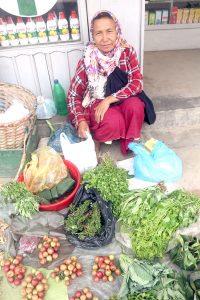Nagaland
Plight of the Naga women vendors in Nagaland

Atono Tsukhru
Kohima, June 19 (EMN): A large number of Naga women are seen engaged in vending both forest and locally grown products as a source of livelihood to sustain their family. Most of them are found to be from rural background with low economic status and are either school drop-outs or illiterate.
Though they are often ignored by both the public authorities and the people, street vendors are providing valuable services to the urban masses through their own enterprise, limited resources and labour. They facilitate convenient, efficient and cost-effective distribution of goods and services to the public.
While vending has become the main source of income for many of the Naga women and thereby providing access to local food products to the town dwellers, the sad fact remains that their contributions to the local economy remains largely invisible.

In the absence of proper infrastructure for the vendors and a designated space for the vendors to carry out their businesses especially in Kohima town, these local women are compelled to sell their products in the street, lane, footpath and pavement.
In an interaction with some Naga women vendors along the streets of Razhü Point and Phoolbari, it was learned that these women are carrying out their businesses under constant fear and insecurity of being evicted anytime. Public authorities often regard them a ‘nuisance and as encroachers’ of sidewalks and pavements.
Under the given circumstances, these women are forced to carry out their businesses in the most unhealthy and unhygienic places near open drainage and sewage exposing and making them vulnerable to all kinds of diseases.
With no sheds over their heads, these women are exposed to the sun and rain just to earn some few hundreds to make up the capital incurred in buying the vegetables from other wholesale dealers.
Among several other problems, some of the problems faced by these women everyday are lack of free access to drinking water, toilet facilities and storage facilities. As most of their products are perishable products, they are either forced to sell off at cheap prices or wasted.
Interestingly, unlike the vendors along the streets, women vendors in Supermarket area are spared from the sun, rain and tax as they have a permanent designated place of their own. Talking to Eastern Mirror, Neinuo Solo, a member of women vendors said they have constructed the building through collection of a small amount over the years.
‘Dierhezo Krotho’ building which is under completion, she said started in the year 2012 with the primary objective to give opportunity to the women from various khels in Kohima village to carry out their business activities financed by the women themselves.
Solo also informed that at present there are 43 women vendors who are involved in vending in the Supermarket area.
There are 354 Naga vendors in Kohima town, 601 in Dimapur and 975 in Pfutsero town as per the study conducted by the North East Network (NEN) Nagaland and Exotic Echo Society Dimapur in August 2013 – April 2014 on ‘local markets and street vending with special focus on women vendors in Nagaland.’
The study also found that with development of the towns, vendors are increasingly facing problems in pursuing their vending activities as they are not only ousted by the development of shopping complexes and supermarkets but also from spaces occupy for the expansion of roads, parking lots etc.
It further stated that when new structures comes up, women vendors are not able to afford the huge deposits to rent out a space as many of them are from rural background with low economic status so vending in any open space is the best way to set up their business since they don’t have to invest on the plot/space except for some amount of tax to be paid towards the municipal council/town council, land owners etc.
Though a Central Bill on Street Vending (Protection of Livelihood and Regulations of Street Vending) Bill 2009 have been passed in the Lok Sabha 2013 and Rajya Sabha in 2014 with the Supreme Court instruction that each state should have at least have a Street Vendors Policy, Nagaland state so far did not put a state policy in place till now.
Another study was conducted by Centre for Civil Society, Social Change through Public Policy authored by Prashant Narang Dr Yugank Goyal titled ‘Street Vendors Act State Compliance Index 2017’ to objectively compare different states on the bases of their performance in implementing the Act.
Engaged with secondary surveys of each state in India and through a series of RTIs, pulled out the compliance status of the Act (refer to the Data Collection in Appendix), the study found out that Delhi tops the list while Nagaland score zero in the implementation of Street Vendors Act Compliance Index (SVACI).
Coming under the category of Group D (no compliance) along with Arunachal Pradesh, Madhya Pradesh, Puducherry, Sikkim and Uttarakhand, Nagaland is said to have not provided them with any data given the extensive efforts they put in to fetch data.

